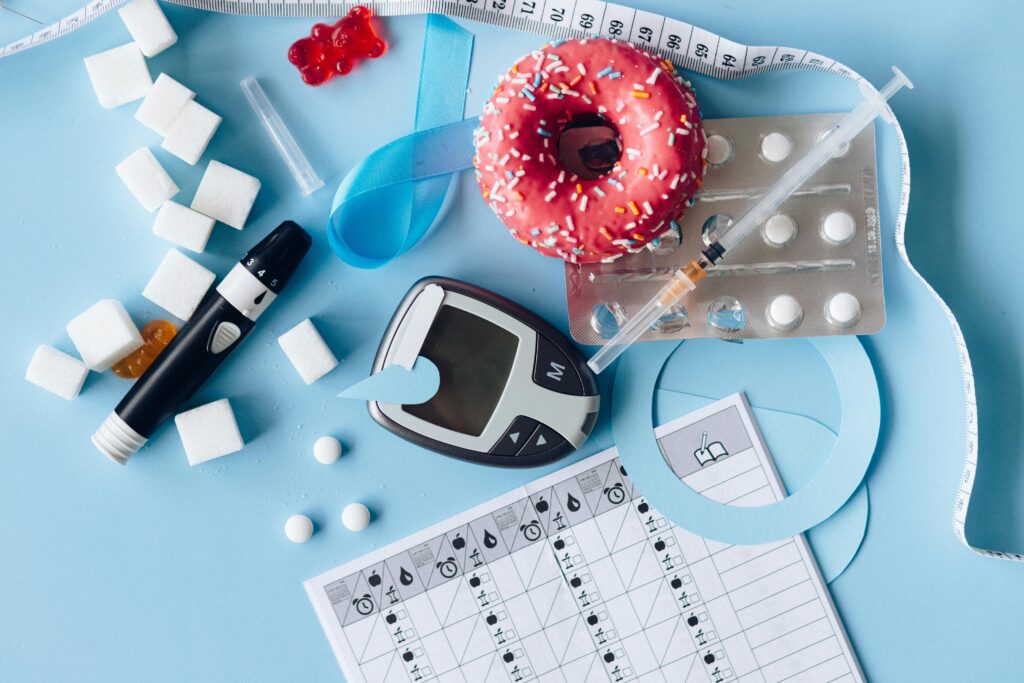Glp-1 & Gip analogs for diabetes treatment
(Ozempic®, Trulicity®, bydureon®, rybelsus®)
- What are GLP-1 &/or GIP agonsits?
Insulin is a hormone produced by the pancreas which help movement of glucose from our blood into our cells and tissues. Diabetes mellitus is a disorder in which blood glucose (BG) is higher than normal. This occurs because of insufficient insulin release from the pancreas or improper response of cells to insulin. The release of insulin from the pancreas is modulated (fine-tuned) by two hormones our intestines produce (collectively called INCRETINS) when we start eating. The 2 main incretins in humans are: glucagon like peptide 1 or GLP-1 and gastric inhibitory peptide (GIP). These incretin hormones are rapidly removed from circulation by an enzyme called DPP- 4 (dipeptidyl peptidase-4).
In patients with type 2 diabetes, and the incretin effect is reduced. The reduced incretin effect may be 1 of the mechanisms contributing to I have blood glucose levels and increased weight in those with type 2 diabetes.
GLP-1 &/or GIP agonist are medicines made by changing the structure of our naturally occurring GLP-1 &/or GIP hormones by some slight modifications, which retains the ability to help glucose homeostasis (balance) but prolonged their half-life so that they can be administered once a day or once a week, depending on the particular medicine.
Most of these medications have to be taken as injections!!
- What are some of the GLP-1 &/or GIP agnoists available in the USA?
There is one medicine available in the USA (as of Nov 1, 2022) which is aGLP-1 & GIP agonist. It is called MOUNJARO® (Tirzepatide).
Several GLP-1 agonists are available in the USA. They have been in the market for some time, therefore we have more experience using them. They include:
- OZEMPIC® (Semaglutide)
- TRULICITY® (Dulaglutide)
- BYDUREON / BCISE (Exenatide extended release)
- RYBELSUS® (Semaglutide)
- VICTOZA® (Liraglutide)
- How do the GLP-1 &/or GIP agnoists work?
GLP-1 &/or GIP agonists help our body balance her blood glucose levels by four mechanisms:
- By helping the pancreas to produce more insulin
- By reducing the release of another hormone called glucagon (which has the opposite effect on glucose compared to insulin). This action reduces the livers ability to make glucose.
- By keeping the food in the stomach longer so the patient feels full sooner
- By suppression of appetite
- What are some of the benefits of taking GLP-1 &/or GIP agnoists?
- Improved blood glucose levels (in general HBA1C can be reduced by 0.5 to1.5%).
- They do not cause hypoglycemia (low blood glucose levels); unless given with insulin or sulfonylureas (such as glipizide or glimepiride)
- May help facilitate weight loss.
- May help reduce the risk of heart attacks and strokes (by ~ 22%)
- What are some of the side effects of GLP-1 &/or GIP agnoists?
- Sometimes GLP-1 &/or GIP agonists can cause nausea, diarrhea or vomiting. This is particularly common when you first start taking but usually the symptoms get better and may stop after a few weeks.
- Sometimes, local irritation may occur where the medications are injected (local redness or bumps)
- As mentioned above, low blood glucose levels (hypoglycemia) does not occur with these medicines when they are used alone
- In rare cases, pancreatitis (inflammation of the pancreas) can occur these medications. The symptoms of pancreatitis may include stomach and back pain usually severe accompanied by nausea and vomiting. The symptoms occurred, call your doctor right away.
- Who should not take GLP-1 &/or GIP agnoists?
GLP-1 &/or GIP agonists should not be prescribed to:
- Patients with type 1 diabetes mellitus (sometimes physicians use it “off label”)
- patients with a family history or personal history of medullary thyroid cancer (an uncommon form of thyroid cancer) or MEN-2 (multiple endocrine neoplasia 2)
- Patients with a previous history of pancreatitis
- Patients with significant or severe gastrointestinal disease such as gastroparesis, severe gastroesophageal reflux or inflammatory bowel disease
- Pregnant patients or those patients who are trying to get pregnant
- Patients with severe kidney disease
- Previous history of allergic reaction to these agents
- FAQ – when you are prescribed GLP-1 &/or GIP agonists?
- Most of them are given once a week as injections. If you are prescribed 1 of these agents, and generally you take them on the same day each week with or without food.
- If you miss a dose of once weekly preparations, take the missed dose as soon as possible, within 3 or 4 days after the missed dose
- Usually, your doctor/health care provider will prescribe a starting dose which is the lowest available dose of the particular agent being used in your case. After about 4 weeks, if you are tolerating that dose without significant nausea or vomiting, your doctor/ HCP may increase the dose.
- Used sharps can be placed in a strong, plastic container to be disposed of safely. There are many types of containers available. Some are made specifically to hold used sharps (usually at a pharmacy or online). The patients may also use an empty laundry detergent or bleach bottle.
- Containers with used sharps cannot be placed in household trash in certain states (Seattle, Massachusetts, California). Sharp disposal guidelines vary depending on where you live. Please check with your local health department or trash removal companies to see which method is approved for your community. Options may include:
- Drop box or supervised collection sites (hospitals, pharmacies, health departments and police or fire stations
- Local public household hazardous waste collection sites
- Special FDA-cleared mail back programs (usually for a fee)
- Residential special waste pick-up services (usually for a fee)
- Useful links for more information:
https://safeneedledisposal.org (Phone: 800-643-1643)
Bloodborne Infectious Diseases: Safe Community Needle Disposal | NIOSH | CDC
- When should you hold or not take GLP-1 &/or GIP agonists?
- If you are sick and unable to keep anything down
- If you are going to have surgery, GLP-1 &/or GIP agonists should be stopped on the day of surgery & resumed when you start eating again
- If you experience symptoms of acute pancreatitis (severe mid upper abdominal or back pain with nausea and vomiting).
- We believe all content used falls under the remits of Fair Use. If any content owners would like to dispute this, we will not hesitate to immediately remove said content. We do not intend to infringe on content ownership. We will be glad to credit you, in case you find your heart or images on our website. We are not your healthcare provider, and your use of this website does not establish a patient-client relationship. All the information contained on this website is for informational purposes only. No material on this site is intended to be a substitute for professional medical advice (diagnosis, treatment, testing or nutritional information). Always seek the advice of your physician or qualified healthcare provider with any questions you may have regarding medical or health-related conditions or treatment. Your healthcare provider knows your condition or situation well and can give you specific advice which would be appropriate for your condition/situation. Your healthcare provider can also guide you more accurately about injection techniques, dietary interventions and the use of medical technology that is most pertinent and suitable for you. Please do not disregard professional medical advice or delay in seeking it because of something you may have read on this website.
Post Disclaimer
We are not your healthcare provider, and your use of this website does not establish a patient-client relationship. All the information contained on this website is for informational purposes only. No material on this site is intended to be a substitute for professional medical advice (diagnosis, treatment, testing or nutritional information). Always seek the advice of your physician or qualified healthcare provider with any questions you may have regarding medical or health-related conditions or treatment. Your healthcare provider knows your condition or situation well and can give you specific advice which would be appropriate for your condition/situation. Your healthcare provider can also guide you more accurately about injection techniques, dietary interventions and the use of medical technology that is most pertinent and suitable for you. Please do not disregard professional medical advice or delay in seeking it because of something you may have read on this website.

